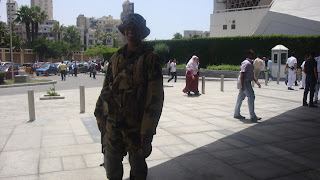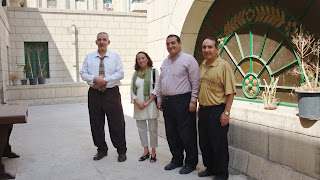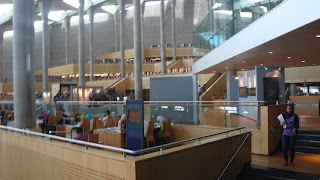Presentations
- Multilingual Subject Retrieval: Bibliotheca Alexandrina’s Subject Authority File and Linked Subject Data.” Poster presented at the First Annual Symposium on International Scholarship, "The Global Landscape: Challenges and Resilience." The International Affairs Faculty Council, Ohio State University. February 27, 2015.
Workshop on Classification and Subject Indexing in Library and Information Science (LIS'2013) as part of the European Conference on Data Analysis Abbey of Neumünster Cultural Exchange Center (CCRN), Room A11, Luxembourg, July 8-12, 2013 (Program Website)
The Ohio State University--- Office of International Affairs. Presentation, April 15 - 19, 2013, 2014, 2015-
- Bibliotheca Alexandrina Subject Authority File and Linked data ALCTS CaMMS Cataloging & Classification Research Interest Group at ALA Midwinter. Sunday, January 27, 2013.Time: 10:30 am – 11:30 am. Location: Renaissance Seattle Hotel – Compass South
[ABSTRACT] The Bibliotheca Alexandrina (BA) started to build its own authority file since September 2006. This includes subject headings, personal names, corporate bodies, series, and uniform titles. The BA authority file is unique in that it is built on the actual collection and is different in its structure than LC/OCLC authority files. The focus of this research is on the subject component of the BA authority file. This includes the Latin and non-Latin subject heading. This research will address the workflow of creating the subject heading authority records; the linking data process; the similarity and difference between the BA authority file and the LC/OCLC authority file. It will also address the advantages and disadvantages of creating a local authority file and how to integrate the BA authority file into the international arena.
The Near East and South Asia Subcommittee and the Africa Subcommittee of ALA’s International Relations Committee invite you to this special program featuring eyewitness accounts from two librarians present in Cairo during Egypt’s revolution.
[ABSTRACT] On January 25, 2011, the people of Egypt went out into the streets in a massive protest against the government of Hosni Mubarak. This was the first in a series of tumultuous days that brought life in the Egyptian capital to a standstill. Just completing the second month of her 9-month teaching and research grant at the Alexandria Library, Magda El-Sherbini found herself in the eye of the revolutionary turmoil. She will share her observations of the impact of the revolution on librarians and their attitudes, as well as descriptions of the specific events organized by the library that played an important role in educating people about social change and the democratic process.
- OCLC VIAF Show and Tell. Presented at the OCLC at the invitation of Karen Smith – Yoshimura, OCLC Research December 12, 2011
Ohio State University Library. Fall Faculty Forum/Brown Bag, Wednesday, December 7, 2011, 11:30 a.m. - 1 p.m., Thompson Room 150 A& B (This research was conducted while I was a Fulbright Scholar in Egypt)
[ABSTRACT] An important part of access to information is name and subject authority work. Authority work assures that the same form or version of a name or subject is used by everyone, so that a researcher in Egypt, the United States, Japan, or any country on earth can use the exact same form of a name to find all the materials on a specific individual. This is particularly important for Arabic names, which can have multiple parts. For example, a classical Arabic name, such as “Abu al-Fadl 'Abd al-Rahman ibn Abi Bakr Jalal al-Din al-Suyuti“ has multiple elements, each of which can be assigned differently depending on the country in which the cataloging or organization is being done. This means there is a lack of uniformity for the form of Arabic names around the world. This research is to:
Study and evaluate the Arabic name authority file and the Arabic subject access file that the Bibliotheca Alexandrina is developing. Compare them to the international name authority file created by the Library of Congress (US) to identify data elements contributed to the file by the BA that may be of value to LC and vice versa. Look at how VIAF (Virtual International Authority File) and SKOS can facilitate international exchange of data.
- Bibliotheca Alexandrina's model for Arabic name authority control Library Resources & Technical Services, 00242527, Jan2013, Vol. 57, Issue 1
[ABSTRACT] This paper describes the processes developed and implemented at the Bibliotheca Alexandrina (BA) to manage authority control in a multi-script environment. The author addresses key issues associated with creating a local authority file for multi-script materials', unique challenges associated with Arabic names, and authority control policy decisions and practices in place at the BA, including contributing records to the Virtual International Authority File. The author highlights important work that the BA is doing to promote standards for Arabic names in a way that takes into account user needs in the Arab community, as well as international standards, while laying the groundwork for further cooperative work between libraries in the Arab world and beyond. A detailed description of workflow with examples is presented.
Stories
- Fulbright Story While I was in Egypt in 2010-2011. Published in “ALA International Leads” 27, no.2, 2013
- Egypt’s Spring and Turmoil on a Fulbright Grant. Presented to the OSU, Sponsored by the Library’s Diversity and Inclusion Committee. Tuesday, May 1, 11:30 a.m. – 1 p.m. Thompson Library, 1858 Neil Ave. Rooms 150 A/B
[ABSTRACT] In January 25, 2011, thousands of Egyptians poured into Tahrir Square, the symbolic heart of Cairo. They spilled across the venerable Qasr-al-Nil bridge, broke through security barriers as they raced through downtown streets, and marched in small clusters or long lines along the Nile Corniche from the southern and northern districts. Egypt’s spring had begun. In this informal talk, El-Sherbini will discuss her experiences during the revolution in Egypt and the Alexandria Library. She will talk about her research and also share her observations on the role of the library as a culture center. In this cultural eveant, Egyptian dessert and tea will be served.
- Global Perspectives - autumn 2010 Newsletter. The Ohio State University- Office of International Affairs
[ABSTRACT] Magda El-Sherbini, Associate Professor, and Head of the Cataloging Department at The Ohio State University Libraries, has been selected a recipient of the prestigious Fulbright fellowship. Recipients are selected by the Council for International Exchange of Scholars, which administers the program for the U.S. Department of State. The Office of International Affairs serves as the campus representative for the Fulbright Scholars program.e
Exhibit
- Egyptian Artifact Reflect Egypt’s Past and the Present
A collection of Egyptian objects that were collected and purchased in Egypt during Magda El-Sherbini’s visit to Egypt on a Fulbright in 2011 are on display in the atrium of the Thompson Memorial Library until the end of summer, 2013. Ms. El-Sherbini selected the objects on display and provided descriptions for each item, giving historical background and cultural significance of items displayed.
The visitors can view a selection of objects that include musical instruments, crafts, costumes, textiles, papyruses and other objects to represent the cultural heritage of Egypt.
Traditional instruments from Egypt are on display above. Egyptian oud is a stringed instrument similar to a lute. The tabla on the right is a traditional drum that is still used today.
Themes of ancient Egypt are reflected in modern textiles, ceramics and metalwork. The brass Ankh is a symbol of the sun rising above the horizon. Porcelain plates depict an image of Cleopatra.
Samples of textiles and traditional clothing. The tarboush hat is an echo of Ottoman times in Egypt.






































